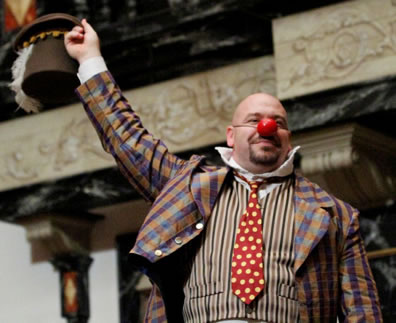As You Like It
Restless Ecstasy, As You Like It
American Shakespeare Center, Blackfriars Playhouse, Staunton, Va.,
Saturday, April 23, 2011, C–6&7 (center stalls)
Directed by Jim Warren
The phrase “restless ecstasy” comes from Macbeth, but it was this production of As You Like It that seemed the greater inspiration for the name of ASC’s Restless Ecstasy Tour troupe, in residence at its home theater. This As You Like It was restless ecstasy in the extreme, perhaps intentionally so to contrast more with the other two productions in the troupe’s repertoire, the dramedy Measure for Measure and the tragedy Macbeth.

Rick Blunt as Touchstone joins in the festivities of a romping As You Like It at the Blackfriars Playhouse. Blunt carried a marotte that was a spitting image of himself as Touchstone, with red nose and polka dot tie. Photo by Tommy Thompson, American Shakespeare Center..
There was lots of stomping (especially Kelley McKinnon’s Phoebe). There was lots of gesturing (especially Denice Burbach’s Rosalind). There was fanciful costuming (while the lords and ladies resided in the first decades of the 20th century, the shepherds wore a cross of Bavarian and Serbian ethnic outfits). There was lots of music, with Shakespeare’s lyrics set to original compositions by Jake Mahler, who, even when portraying the famished Adam, had a mandolin handy to join in the music-making.
And there was lots and lots of lust. Before meeting Orlando, Burbach’s Rosalind and Brandi Rhome’s Celia got giddy over men; Rosalind even hit on several males in the Blackfriars audience. Both ladies swooned over Orlando, who in turn was struck dumb by the duo; Rosalind prevailed by virtue of offering him her chain, but he would have taken either woman. Celia and Oliver (Daniel Jimenez) were all-engrossedly smitten upon their meeting, and McKinnon’s Phoebe clamored all across the stage in chase of "Gannymede." Touchstone (Rick Blunt, wearing a red clown nose and carrying a bearded, bald, red-nosed marotte that was a spitting image of Blunt) may not have been so obvious in his lust because he effected to be a true courtier, but lust was his sole drive for marrying Audrey (Natasha Solomon). Only Silvius (Dennis Henry) among the lovers placed sexual passion on a higher plane—and earned a lifetime of Phoebe for his efforts.
Speaking of lust, we must mention that which flowed from the women in the audience toward Jonathan Holtzman, who played Charles the wrestler, unshirted, as a Jersey shoreman. When in the musical interlude Holtzman sang “Wild Thing” to a college student in the front row, her infatuation in fact was of the kind Rosalind oozed toward Orlando in the fiction. Also in our audience was a little girl, maybe 9 years old, sitting on one of the gallants' stools to the side of the stage, reacting in delight to the lines as well as the antics. She gaped in utmost indignity when Rosalind asserted that maids are May when they are maids, “but the sky changes when they are wives.”
The little girl wasn’t the only spectator on the stage worth our attention. Rhome not only played a hearty Celia propping up Rosalind’s spirits at the beginning of the play, she also was a delightful Celia just quietly watching Rosalind do her thing with Orlando, Phoebe, and Silvius. You could while away a perfect evening merely watching Celia watching them.
In a production in which lust and laughter literally stormed across the stage, the pillar of darkness that was Jacques stood stark. Aidan O’Reilly, ever so dour except when he was in conniptions dealing with Duke Senior, Orlando, and Rosalind, turned Jacques into a great comic character in part because of the contrast. After the Duke and his lords had been restored to their places and celebration took over the stage, Jacques’ shouted from behind the audience of “Sir, by your patience.” Just this line piercing through the revelry inspired one of the play’s biggest laughs. In that laughter, the audience, much of which was unfamiliar with the play, seemed to say, “Oh, there’s that Jacques again.”
Another revelation came in Dennis Henry’s portrayal of Duke Frederick. When he banished Rosalind, he grew increasingly discomfited, unable to express an adequate reason for his actions (and in asides he didn’t want Rosalind to overhear, he tried to hush his own daughter for her “foolishness”). Then, after ordering Oliver to find his brother “dead or living” and Oliver announced how much he himself had always hated his younger brother, Duke Frederick replied: “More villain thou”—this from the man who had banished his own brother. I suddenly saw in this moment with Oliver and earlier with Rosalind that Shakespeare was setting the stage for the usurping duke’s conversion at play’s end.
Eric Minton
April 25, 2011
Comment: e-mail editorial@shakespeareances.com
Start a discussion in the Bardroom



 Find additional Shakespeareances
Find additional Shakespeareances